A complaint filed last week by a victim of forced labor and three rights defenders against the International Finance Corporation (IFC), contains the usual accusations: Uzbekistan’s cotton harvest includes systemic use of forced labor and IFC loans (the IFC is a member of the World Bank Group that engages specifically in private sector investment) are used to support that system.
There have been consistent reports of forced labor practices in Uzbekistan–reflected most recently in the country’s downgrade in the U.S. State Department’s 2016 Trafficking in Persons report. Activists say the IFC and World Bank are inadvertently supporting such practices by investing in Uzbekistan’s cotton industry.
Beyond the human rights issue, the complaint sheds light on the opaque financial systems surrounding the cotton industry. By focusing on a single project, the details of exactly how the Uzbek government directs the industry at many levels become more clear.
The complaint was filed on June 30 with the Compliance Advisor Ombudsman–an independent recourse mechanism which fields complaints regarding the impact of IFC and MIGA (the Multilateral Investment Guarantee Agency, another World Bank Group member) projects–to seek the investigation of a $40 million IFC loan to Indorama Kokand Textile. The complaint alleges that the IFC loan–part of a project to expand IKT’s manufacturing operations in Uzbekistan–profits from forced labor.
IKT is referred to as a “leading cotton yarn producer” by the IFC project documents, and the loan–approved by the World Bank Board of Directors in December 2015–is intended to help the company expand its manufacturing capacity in Uzbekistan. IKT, a joint venture between Indorama, a subsidiary of a Jakarta-headquartered fiber and filament holding company the Indorama Corporation, and the National Bank of Uzbekistan. Indorama is the majority stakeholder. IKT was established in 2011, and Indorama says the benefit of setting up shop in Uzbekistan is “the “natural advantage of sourcing competitively priced raw cotton fiber from domestic sources.”
As the complaint lays out, Indorama has been on the receiving end of favorable policies–such as deferred tax benefits, VAT reimbursement, discounts on export pricing, and the provision by the state of some facilities free of cost. But there are significant restrictions as well, which the complaint argues, makes it difficult for the company to get loans and impossible for IKT to operate without using cotton harvested with forced labor. For starters, “Indorama is required by the Uzbek government to hold its equity stake in IKT within Uzbekistan.”
Under the government’s regulations, Indorama is required to maintain a “reserve” on its investment in IKT in the amount of US$10,403,000, which “represents the difference between the value of investment made by [Indorama] in IKT and the value of IKT’s paid-up capital.” As a result, Indorama is prevented from utilizing its assets as collateral for securing credit from a private lending institution and must rather seek credit from the IFC, which is capable of providing loans on high risk investments.
Then Indorama is forced to seek permission from the Uzbek government in order to repay its IFC loans as the country “prohibits the exchange and transfer of currency to banks outside the country.”
Moving beyond the financial tangles–which decidedly bind a private sector business to the good graces of the Uzbek government–is the supply chain.
As Uzbekistan imports no cotton, all cotton processed into yarn by IKT must come from within the country itself. The state imposes annual production quotas on farmers, maintains a monopoly not only on the purchasing of cotton but on the input industries (seeds, fertilizers, equipment, etc), channels cotton into state-owned gins (from which IKT sources), and funnels all proceeds from the industry into an extra-budgetary account, the Selkhozfond. The murky system locks farmers into place–preventing them from growing more profitable crops or shopping around for higher prices–meanwhile diverting revenues into a black box. For the World Band and the IFC–which have core missions of poverty eradication and boosting private industry, respectively–Uzbekistan is a tremendously difficult case.

































